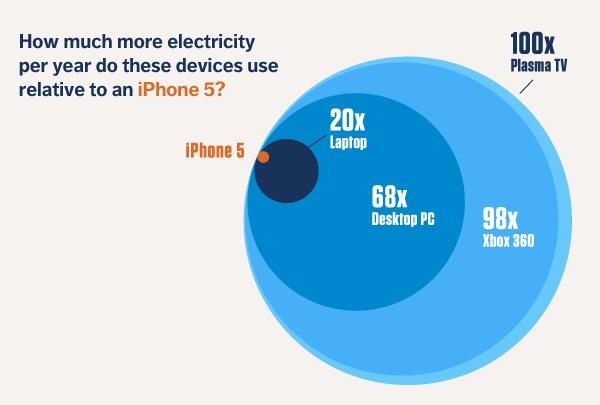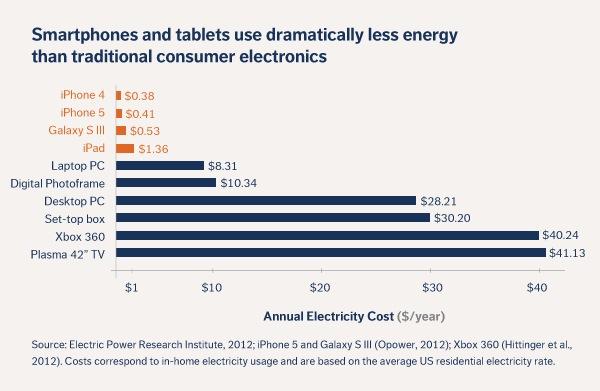One of the standout features of Apple's new iPhone 5 is its long battery life which, despite cramming in a faster processor, LTE wireless capabilities and a larger screen, performs on par with its predecessors and has been found to cost only three cents more to charge per year.
A test from Opower (via CNET) found that it costs an estimated 41 cents per year to keep Apple's new iPhone 5 charged, a three cent bump from the legacy iPhone 4. Estimations were based on a once-a-day charging schedule.
The numbers are to be expected as the iPhone 5's 3.8V, 5.45WH battery holds only slightly more juice than the 3.7V, 5.3Wh found in the iPhone 4S. In comparison to the third-generation iPad, however, the yearly cost to charge the new iPhone is less than one third the price.
One interesting statistic puts the electricity used by all 170 million iPhone 5s expected to be sold over the next 12 months as enough to power all the homes in Cedar Rapids, IA for one year.
Going further, the iPhone 5's yearly charge cost is 12 cents under the 53 cents it takes to charge the competing Samsung Galaxy S III smartphone. That device has a huge 2,100mAh battery, most likely needed to power the unit's massive 4.8-inch display.
"The paramount point here though is not the difference between the two phones," Opower writes, "but rather their striking similarity: the energy consumption of a modern smartphone is minuscule."
According to Opower, the use of smartphones and tablets as replacements for computers can contribute to drastic energy savings.
"Put simply, a day spent web-surfing and facebooking on a smartphone or tablet is a much more energy-efficient day than doing the same on a traditional computer."
 Mikey Campbell
Mikey Campbell









 Charles Martin
Charles Martin

 Malcolm Owen
Malcolm Owen
 William Gallagher
William Gallagher

 Christine McKee
Christine McKee
 Wesley Hilliard
Wesley Hilliard








28 Comments
Call me crazy, but I thought the most interesting cost segment of the iPhone (and all of the other smartphones for that matter) was not the electricity, but the ~$1000/year in cellular charges. Compared to that, even running my G5 Quad 24x7 was cheap.
[quote name="AppleInsider" url="/t/152970/study-finds-iphone-5-costs-only-41-cents-per-year-to-charge-3-cents-more-than-iphone-4#post_2201087"]One of the standout features of Apple's new iPhone 5 is its long battery life which, despite cramming in a faster processor, LTE wireless capabilities and a larger screen, performs on par with its predecessors and has been found to cost only three cents more to charge per year. A test from Opower (via CNET) found that it costs an estimated 41 cents per year to keep Apple's new iPhone 5 charged, a three cent bump from the legacy iPhone 4. Estimations were based on a once-a-day charging schedule."[/quote] The numbers are incorrect. They way they determined them was to find out how long it took to charge an iPhone and how much power it drew when being charged and multiplied. Using that calculation assumes: 1. You unplug the phone in the instant that it's fully charged. 2. The charger does not use any power after the phone is charged or after the phone is unplugged. So unless you unplug the charger from the wall the instant the phone is charged, their numbers are too low. Of course, it's not a big deal - even if the charger were running at full power constantly, it would only be a few dollars a year. But when you multiply the total by 100 M phones, the difference starts to become significant.
First the maps fiasco, now this! Millions of users were left disoriented because of the worthless maps app, and now you're telling me the iPhone 5 costs $.03, count 'em $.03 more to charge--per year!! I am outraged that Apple has gotten so big that they treat their customers like this! I used to love Apple products, but I can't support a company that is so environmentally irresponsible.
I still want Apple to release a mega powerful, Mac Pro, unlike anything ever seen before. To hell with the green people. Just make it so insanely powerful and don't worry about low power usage or any of that other environmental crap that certain crazy people talk about. The Mac Pro is not a device to carry around in your pocket. If somebody can afford a Mac Pro, they can also afford to pay for the electricity that a super powerful machine would use. I don't care if it's 24 core and uses 1000 watts.
Apple has been doing mighty fine in the mobile world lately, but I'd like to see them up the ante when it comes to their pro customers also, customers whose main priority is performance and power.
One of the standout features of Apple's new iPhone 5 is its long battery life which, despite cramming in a faster processor, LTE wireless capabilities and a larger screen, performs on par with its predecessors and has been found to cost only three cents more to charge per year.
A test from Opower (via CNET) found that it costs an estimated 41 cents per year to keep Apple's new iPhone 5 charged, a three cent bump from the legacy iPhone 4. Estimations were based on a once-a-day charging schedule."
The numbers are incorrect. They way they determined them was to find out how long it took to charge an iPhone and how much power it drew when being charged and multiplied. Using that calculation assumes:
1. You unplug the phone in the instant that it's fully charged.
2. The charger does not use any power after the phone is charged or after the phone is unplugged.
So unless you unplug the charger from the wall the instant the phone is charged, their numbers are too low.
Of course, it's not a big deal - even if the charger were running at full power constantly, it would only be a few dollars a year. But when you multiply the total by 100 M phones, the difference starts to become significant.
Additionally it appears to assume arbitrarily that the battery is completely discharged each day, so all they are really comparing is battery capacity.